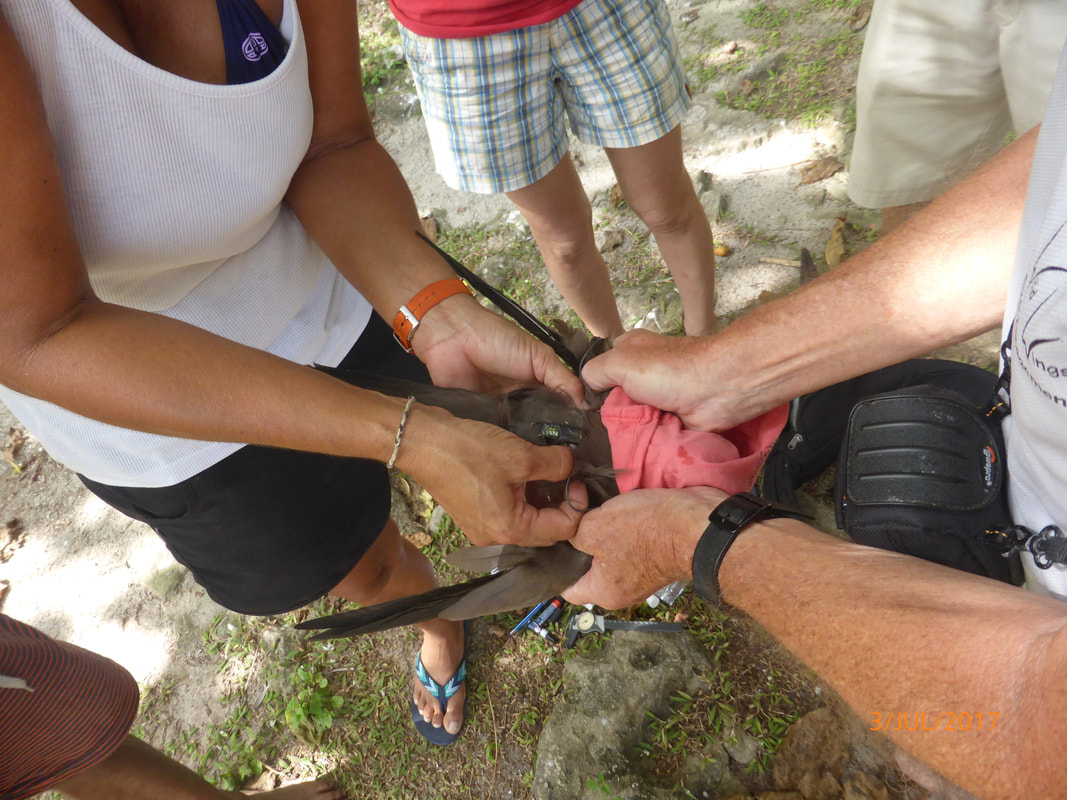|
On first inspection Aride looks like any of the other inner Islands of Seychelles. As the northernmost of the central islands, it is actually smaller than most-it only covers 72 hectares and reaches a maximum height of 134 meters. If you didn’t know your destination you would probably describe the island as ordinary. Day-break on the Aride beachThe boat trip to the island offers hints as to what awaits. You might encounter a school of bonito feeding on baitfish, with seabirds flocking around to pick up a morsel. Once you get close enough you catch a glimpse of what makes Aride special: the image of thousands of shapes radiating around the island and its surrounding waters. A little bit closer and you can make them out as seabirds, but at a scale which you’ve never imagined. The official numbers are staggering: almost a million seabirds make Aride their home during breeding season! Thousands of them are in the air at any given time, either engaging in a courtship ritual, collecting nesting material, getting a drink of seawater, or heading out to feed. Soon you can hear their squawking as well, which might appear to be for no other reason than to keep up the constant din of noise around the island. As you set foot on land the assault on your senses is completed with an overwhelming smell of earthy manure to welcome you at your new home. Luckily these intrusions are soon normalized into your daily routine and even offer a sense of comfort after a spell off the island. The staff on Aride are vastly experienced and possess knowledge of the most intricate details regarding the island’s species. This makes your transition to island life a seamless experience as you are soon introduced to the numerous conservation projects on the island. Your day may start off with a turtle patrol, requiring you to walk the length of the beach in the morning looking for turtle tracks (not the worst way to start a working day), or you can be responsible for feeding the critically endangered Seychelles Magpie Robin, which is part of a re-introductive breeding program. Among the many other activities volunteers participate in is the monitoring of the various seabirds and invertebrates on the island, while you are also required to help in the annual seabird census or a census of Wright’s Gardenia, another critically endangered plant species endemic to the island. Although hard work, these activities provide you with practical experience in the field of conservation and gives you the satisfaction of a job well done when returning from a long day in the forest. A highlight of my time thus far on Aride has been a training course involving GPS tagging of seabirds under the GOS-UNDP-GEF Outer Islands Project. Presented by WildWings Bird Managements’ Chris Freare and Christine Larose, we were instructed on their tried and tested method for tagging birds with GPS loggers. After first having a go at fitting fake tags on dummy birds, we were given the opportunity to try our hand at the real thing. We quickly realized that working with live animals are considerably more challenging (and painful if they get hold of a finger), but nevertheless we persevered and by the end of the week we all managed to fit tags under the accepted maximum handling time of 10 minutes. We were also interested to see the result of our labors when a tagged Brown Noddy was recaptured and the GPS data of its movements downloaded to reveal the feeding areas used by the bird. Through this information, we were told, it becomes possible to protect endangered bird species by creating Marine Protected Areas (MPA’s) around their prominent feeding zones.  Participants having a go at deploying fake tags on Brown Noddies. Photo credit: Ciara Sexton. Participants having a go at deploying fake tags on Brown Noddies. Photo credit: Ciara Sexton. You may find that some birds are just as eager to have a look at you. Pictured are Fairy Terns coming down for a closer inspection.
Personally my time on Aride has achieved its goals in affirming my future career aspirations. I came to Aride unsure about which path I would take with my Biological Sciences degree, but the rewarding work I have experienced on Aride has ensured it will remain in environmental conservation. *Willem Malherbe is a MSc graduate in Fisheries Sciences from South Africa.
1 Comment
Kenneth MacAllister
8/10/2021 01:14:27
Interested in volunteering for ics on aride island as I have recently retired from my position as an exploration geologist. However, not sure if the volunteer program is up and running again yet?
Reply
Your comment will be posted after it is approved.
Leave a Reply. |
Categories
All
Archives
June 2024
|


